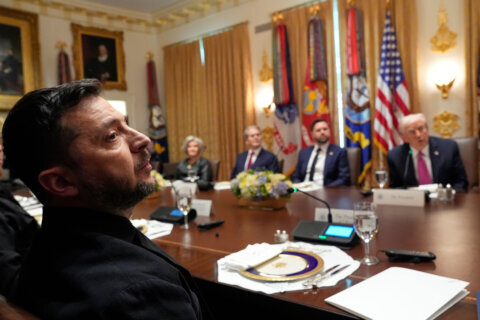WASHINGTON — One year ago in an exclusive interview with WTOP, National Counter Intelligence Executive (NCIX) and director of the National Counterintelligence and Security Center (NCSC) William Evanina warned that cyber criminals were getting “faster and smarter.”
We now know what they’ve been doing.
FBI Assistant Director for Counter Intelligence Randy Coleman said Thursday at a joint news briefing with the NCSC that their intelligence collection activities and investigations indicate “a 53 percent increase, since last year at this time, in the number of economic espionage cases that we’re involved in.”
“It’s a significant threat to the U.S. economy we’re seeing,” he added.
At the briefing, the agencies unveiled a stark video, hoping it shocks American businesses — large and especially the small ones — into paying attention to seemingly benign occurrences that may be sophisticated attempts to steal their company secrets.
The video, called “The Company Man: Protecting America’s Secrets,” features the true story of how two Chinese nationals tried to pay off an actual employee of a real-life Midwestern company to obtain the secret to its window insulation process. But beyond their high pressure attempts to lure the employee with hundreds of thousands of dollars into their trap, they deployed sophisticated social engineering tactics to assist them in their goal. They even tried to lure former employees of the firm with online job recruiting efforts.
The targeted company, which was not named, initially came to the FBI with reports of trespassing, apparently unaware that it was part of an elaborate Chinese government sponsored enterprise to steal their window insulation formula.
“The value of bringing the FBI in early was that we were able to add a larger context to what else these individuals were connected to in China and what they were after and why,” said Dean Chappell, section chief in the FBI’s counter intelligence branch.
Based on statistics revealed by Coleman and Evanina, that case is just the tip of the iceberg.
Evanina said after the briefing, in an interview, “There is a sense of urgency. They are getting it in certain (business sectors) sectors of our country, like energy and financial, but in other sectors, we need to do a lot of catching up.”
He illustrated the striking growth in economic espionage by detailing a survey of 165 private sector companies.
“Forty-six percent of the respondents said foreign adversaries are their number one concern when it comes to their proprietary information and trade secrets. Fifty-one percent said threats inside their company are their number one concern. Fifty percent said the financial information of their industry had been targeted,” said Evanina.
But the most stunning statistic of all, according to Evanina, is that “ninety-five percent (of respondents) listed China as the main perpetrator of (theft) attempts and successful activity.”
Coleman said there are three reasons behind the rising number of espionage cases.
“Number one is the FBI has completely integrated an intelligence apparatus into our operational effort, so we’re able to be more aggressive, proactive and predicative in everything we do.”
That effort has turned up cases that previously might have been missed.
Having assumed the leadership of the FBI’s counterintelligence division a little more than a year ago, Coleman said another driver of espionage today is “the world is very unstable right now you see hostile intelligence services being far more aggressive than they’ve ever been.”
The other factor, he said, is more reporting from businesses that have noticed abnormalities in their businesses and worry there are broader threats that may be behind those aberrations.
The video, produced by the FBI has been shown more than 1,300 times in the last year to selected businesses and organizations, but because of the continued rise in cases, authorities now want more companies to see it and learn what to do about it.








